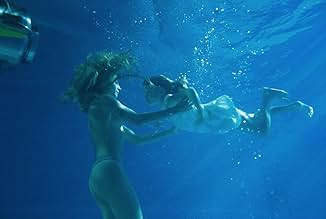Diverses vies convergent sur une île isolée, toutes reliées par un auteur dont le roman est devenu inextricablement entrelacé avec sa propre vie.Diverses vies convergent sur une île isolée, toutes reliées par un auteur dont le roman est devenu inextricablement entrelacé avec sa propre vie.Diverses vies convergent sur une île isolée, toutes reliées par un auteur dont le roman est devenu inextricablement entrelacé avec sa propre vie.
- Réalisation
- Scénario
- Casting principal
- Récompenses
- 11 victoires et 18 nominations au total
María Álvarez
- Enfermera
- (as María Alvarez)
Javier Coromina
- Camarero Chiringuito
- (as Javier Corominas)
Alesandra Álvarez
- Luna 1 año
- (as Alesandra Alvarez)
José Ferreira
- Emplastro
- (non crédité)
Avis à la une
. . .and it's not really even about Lucia! Lucia y el Sexo is actually about Lorenzo, Lucia's novelist boyfriend, and the consequences of a sexual encounter he had in the past which has led to a catastrophic event in his life. It's a languid and tempestuous poem of a movie, told in a non-linear way by the extremely ambitious Julio Medem.
As a novelist myself, I deeply related to Lorenzo's blurring of reality and imagination. Your characters MUST be real to you in order for them to live and breathe on the page, and so much of your own life goes into the characters that the lines of course do blur. And then there's the subconscious, which cannot differentiate between fantasy and reality. Medem understands all this very well, and his depiction of it is remarkable.
The title, I believe, refers to Lorenzo's past (The Sex and what happened as a result of it), and his present (Lucia). Paz Vega and Tristan Ulloa are stunning as the two leads - Vega with her fierce intelligence and Ulloa with his tormented vulnerability. I would have given this film a 10 if it hadn't been for the fact that the most pivotal scene is shot in an incredibly vague manner, which left me confused as to what had actually happened until much later in the movie, but it is a brilliant and heartfelt experience nonetheless.
As a novelist myself, I deeply related to Lorenzo's blurring of reality and imagination. Your characters MUST be real to you in order for them to live and breathe on the page, and so much of your own life goes into the characters that the lines of course do blur. And then there's the subconscious, which cannot differentiate between fantasy and reality. Medem understands all this very well, and his depiction of it is remarkable.
The title, I believe, refers to Lorenzo's past (The Sex and what happened as a result of it), and his present (Lucia). Paz Vega and Tristan Ulloa are stunning as the two leads - Vega with her fierce intelligence and Ulloa with his tormented vulnerability. I would have given this film a 10 if it hadn't been for the fact that the most pivotal scene is shot in an incredibly vague manner, which left me confused as to what had actually happened until much later in the movie, but it is a brilliant and heartfelt experience nonetheless.
Stories told in a so-called "magical realism" style like this film can be very tricky. The story and the characters need to be very strong to sustain all the twists of the plot and I don't think this was pulled off here. I was disappointed, as I'd enjoyed Medem's previous film Los Amantes del Circulo Polar, where the passionate love story seemed a lot more genuine and the tragic ending seemed to fit better with the theme of fate playing with people's lives than Lucia y el sexo's tragic-to-happy contortions.
Also, while the female characters were all charming and sexy, the male roles were really poor and unconvincing. What on earth did Lucia see in Lorenzo? There isn't enough to justify her endurance and patience with him. Their whole love story seems artificial from the inception, it seems there was too much work on the symbolism of their relationship - the tormented writer and storyteller, the reader and savior (Lucia as a ray of sunshine) - rather than on the real intensity of feeling between two people. The sex scenes are too stylish and sleek to be really passionate. Everyone is good looking and well dressed, they live in nice apartments, exist in a bubble where the society around them doesn't seem to affect them, this is obviously purposefully so and ideally you wouldn't mind that lack of realism if the story was engrossing enough, which it isn't.
The entire plot seems to revolve around the concept of the ability to deal with tragic fateful events by rewriting, literally and metaphorically, one's own life story. But the final optimism comes across as too artificial. The plot does not resolve the fate of the child Luna, Lorenzo's daughter. The tragedies seem more like a prop, a trick to demonstrate how love can conquer guilt, remorse and failure. They're not given enough weight. People slash their wrists or throw themselves under buses easier than they cry, then we're supposed to believe they can just forget and forgive and live happily ever after.
The director says he wanted to make everything "light" in this film, after the experience with the previous one. But I think he overdid it! There is a bit too much of the French 'Amelie' in Lucia's character, she is more like a beautiful fairy than a real person. Elena, too, is more a symbol of caring and nurturing (motherhood, cooking, taking care of Lucia) than a real grieving mother. Her lack of anger and bitterness is not very believable. The whole escapist symbol of the floating island becomes annoying after a while. It functions on the characters like a drug inducing apathy and oblivion, more of a way of avoiding pain than confronting it. But it's not that, it's the way in which it's presented and wrapped up at the end that really disappoints - too fancy and too abstract to really work.
It's not a bad film. It's full of eye candy - the spectacularly gorgeous Paz Vegas, the island, the photography - and it is well directed and well acted overall. But without all that, the story itself wouldn't really be worth much.
Also, while the female characters were all charming and sexy, the male roles were really poor and unconvincing. What on earth did Lucia see in Lorenzo? There isn't enough to justify her endurance and patience with him. Their whole love story seems artificial from the inception, it seems there was too much work on the symbolism of their relationship - the tormented writer and storyteller, the reader and savior (Lucia as a ray of sunshine) - rather than on the real intensity of feeling between two people. The sex scenes are too stylish and sleek to be really passionate. Everyone is good looking and well dressed, they live in nice apartments, exist in a bubble where the society around them doesn't seem to affect them, this is obviously purposefully so and ideally you wouldn't mind that lack of realism if the story was engrossing enough, which it isn't.
The entire plot seems to revolve around the concept of the ability to deal with tragic fateful events by rewriting, literally and metaphorically, one's own life story. But the final optimism comes across as too artificial. The plot does not resolve the fate of the child Luna, Lorenzo's daughter. The tragedies seem more like a prop, a trick to demonstrate how love can conquer guilt, remorse and failure. They're not given enough weight. People slash their wrists or throw themselves under buses easier than they cry, then we're supposed to believe they can just forget and forgive and live happily ever after.
The director says he wanted to make everything "light" in this film, after the experience with the previous one. But I think he overdid it! There is a bit too much of the French 'Amelie' in Lucia's character, she is more like a beautiful fairy than a real person. Elena, too, is more a symbol of caring and nurturing (motherhood, cooking, taking care of Lucia) than a real grieving mother. Her lack of anger and bitterness is not very believable. The whole escapist symbol of the floating island becomes annoying after a while. It functions on the characters like a drug inducing apathy and oblivion, more of a way of avoiding pain than confronting it. But it's not that, it's the way in which it's presented and wrapped up at the end that really disappoints - too fancy and too abstract to really work.
It's not a bad film. It's full of eye candy - the spectacularly gorgeous Paz Vegas, the island, the photography - and it is well directed and well acted overall. But without all that, the story itself wouldn't really be worth much.
This is really one of the better constructed movies I've seen in a while.
Both the storytelling and style of the movie can be called unique.
It starts mixing reality with fiction and its hard to tell what really happened and what didn't. It features lots of 'what-if' themes and the story is being rewritten in the characters mind, also with lots of symbolism, mainly with the moon and the water. It doesn't make this the most accessible movie but then again, you don't ever have to watch an European movie for its accessibility.
Things start off quite slow but as the story develops the story gets more and more complicated and non-linear, when the line between fiction and reality gets blurred more and more. It does make the movie hard to follow at times but it at the same time makes the movie more interesting to watch and enables everybody start to define things on their own. You of course have to be open to these sort of movies though. Also the very explicit nudity isn't just for everybody.
Sex plays a key part in the movie. It helps to tell the story and plays a significant role in the story lines and help to indicate when things are truth or fiction. Never before has sex played such a key part in the storytelling of a movie.
This movie is always presented as a Paz Vega but this movie it's main character is in my opinion played by Tristán Ulloa. He's the writer, were the entire movie involves around. The story is mostly set inside his head. The three main actors (Paz Vega, Tristán Ulloa, Najwa Nimri) of the movie are really good and carry the entire movie.
Visually the movie is really great and impresses just as much as the storytelling of the movie. The camera-work and colors are really great and create a very unique atmosphere for the movie. It helps to make "Lucía y el sexo" an even bigger and more enjoyable movie to watch, visually.
Those who are open for an unique, one of a kind, unusual movie experience, will surely be delighted with this magnificent beautiful looking and constructed movie.
9/10
http://bobafett1138.blogspot.com/
Both the storytelling and style of the movie can be called unique.
It starts mixing reality with fiction and its hard to tell what really happened and what didn't. It features lots of 'what-if' themes and the story is being rewritten in the characters mind, also with lots of symbolism, mainly with the moon and the water. It doesn't make this the most accessible movie but then again, you don't ever have to watch an European movie for its accessibility.
Things start off quite slow but as the story develops the story gets more and more complicated and non-linear, when the line between fiction and reality gets blurred more and more. It does make the movie hard to follow at times but it at the same time makes the movie more interesting to watch and enables everybody start to define things on their own. You of course have to be open to these sort of movies though. Also the very explicit nudity isn't just for everybody.
Sex plays a key part in the movie. It helps to tell the story and plays a significant role in the story lines and help to indicate when things are truth or fiction. Never before has sex played such a key part in the storytelling of a movie.
This movie is always presented as a Paz Vega but this movie it's main character is in my opinion played by Tristán Ulloa. He's the writer, were the entire movie involves around. The story is mostly set inside his head. The three main actors (Paz Vega, Tristán Ulloa, Najwa Nimri) of the movie are really good and carry the entire movie.
Visually the movie is really great and impresses just as much as the storytelling of the movie. The camera-work and colors are really great and create a very unique atmosphere for the movie. It helps to make "Lucía y el sexo" an even bigger and more enjoyable movie to watch, visually.
Those who are open for an unique, one of a kind, unusual movie experience, will surely be delighted with this magnificent beautiful looking and constructed movie.
9/10
http://bobafett1138.blogspot.com/
This is one of the better structured movies ever put to screen. It's as complex as Lynch's Lost Highway, but that only adds to the experience. A non-linear structure (in time and space) is applied and Lucia y el Sexo blurs the line between reality and imagination.
Basically, it's like Mulholland Drive: Most of what we see is a dream, imagination. Only a relatively small part did really happen. But this goes one step further: What part is in the eye of the beholder here, because little clues are given so the mystery format is only used to keep us entertained at a basic level.
A writer is the center here. Some parts of his life are probably true (trouble at home, sickness), others are ambiguous, others are certainly imagined. He is in the meta-story, but also places himself in threads in the other stories that come from his imagination. His imagination is formed by applying smaller and larger events (meeting a person at a party, seeing someone in front of the house) in his personal life to his fantasies. His erotic fantasies explain the title, as sex is one of the characters of the story. One of the story lines is again about his script read on the island by one of his imagined characters. Writing the story and telling the story is done simultaneously. As he becomes sick, the characters become helpless in the story. Overall it helps a lot if you keep imagining that you're watching imagined characters being manipulated by the writer. This combines meta-story and story, real with imagination, weaving several threads in a complicated web of story lines. In the end, it is made clear that the story doesn't end but starts again halfway, giving further evidence that viewers can use their imagination at random on this and create their own story out of it.
The meta-story is interesting, but by mixing it with the story itself we see the real story as what it is, a writing trick with imagined characters. That unfortunately diminishes the emotions a movie tries to convey. We're merely watching how a movie is structured, with the imagined story not having the usual dramatic impact.
It's remarkable that so many people are offended by the sex scenes, as it's already in the title. Do they also complain about the presence of aliens in Alien? I found the sex scenes to be made with some honesty; and at least they didn't even shy away of male nudity.
Basically, it's like Mulholland Drive: Most of what we see is a dream, imagination. Only a relatively small part did really happen. But this goes one step further: What part is in the eye of the beholder here, because little clues are given so the mystery format is only used to keep us entertained at a basic level.
A writer is the center here. Some parts of his life are probably true (trouble at home, sickness), others are ambiguous, others are certainly imagined. He is in the meta-story, but also places himself in threads in the other stories that come from his imagination. His imagination is formed by applying smaller and larger events (meeting a person at a party, seeing someone in front of the house) in his personal life to his fantasies. His erotic fantasies explain the title, as sex is one of the characters of the story. One of the story lines is again about his script read on the island by one of his imagined characters. Writing the story and telling the story is done simultaneously. As he becomes sick, the characters become helpless in the story. Overall it helps a lot if you keep imagining that you're watching imagined characters being manipulated by the writer. This combines meta-story and story, real with imagination, weaving several threads in a complicated web of story lines. In the end, it is made clear that the story doesn't end but starts again halfway, giving further evidence that viewers can use their imagination at random on this and create their own story out of it.
The meta-story is interesting, but by mixing it with the story itself we see the real story as what it is, a writing trick with imagined characters. That unfortunately diminishes the emotions a movie tries to convey. We're merely watching how a movie is structured, with the imagined story not having the usual dramatic impact.
It's remarkable that so many people are offended by the sex scenes, as it's already in the title. Do they also complain about the presence of aliens in Alien? I found the sex scenes to be made with some honesty; and at least they didn't even shy away of male nudity.
(8/10) Refreshing, delightful, sexy. moving and thought-provoking movie from Spain. Not really porn (as the title might suggest) although there is some very artistic explicitness. It is movies like this one that remind us that European cinema can scale the emotional dilemmas and mountains of a story where other films look at a storyline in terms of physical developments. Lucia, a young waitress in Madrid, falls completely in love with a writer. After a period of blissful togetherness, something from his past pulls him in two directions. We are caught up in his moral dilemma, of not wanting to lose the wonderful gift he has found and yet not wanting to be untrue to himself. The semi-autobiographical novel he is writing pulls together the story and the emotions and hopes of the characters and introduces ideas that enable them to heal some of their hurt. A central idea is that of finding a hole (symbolically on the sandy beach) where, after reaching the end of the story, you can jump back into the middle. That way you can try an make things turn out better ("If you give me time", says Lorenzo, Lucia's boyfriend.) A more mature and rounded work than the Director's earlier "Lovers of the Arctic Circle", Sex and Lucia combines wonderful acting, a great story, innovative cinema and spine-tingly beautiful photography. One of my favourite films of the year.
Le saviez-vous
- AnecdotesThey say "the island" many times but they don't say its name. It is in fact, the tiny island of Formentera.
- GaffesA full moon between two buildings is shown during midday when Lorenzo meets his daughter Luna for the first time - which is astronomically impossible.
- Crédits fousCredits scroll in the opposite direction.
- Versions alternativesThe US cut removes most of the frontal nudity and runs approximately 2 minutes shorter.
- ConnexionsFeatured in Brows Held High: Room in Rome (2013)
- Bandes originalesUn Rayo de Sol
Written by Daniel Vangarde (as Vangarde), Claude Carrère and Amado Jaén (as Jaen)
(c) Bleu Blanc Rouge Editions Soc - Editions Productions Zagora
Ediciones Musicales Clipper's, S.L.
Meilleurs choix
Connectez-vous pour évaluer et suivre la liste de favoris afin de recevoir des recommandations personnalisées
Détails
- Date de sortie
- Pays d’origine
- Site officiel
- Langues
- Aussi connu sous le nom de
- Lucía y el sexo
- Lieux de tournage
- Sociétés de production
- Voir plus de crédits d'entreprise sur IMDbPro
Box-office
- Montant brut aux États-Unis et au Canada
- 1 594 779 $US
- Week-end de sortie aux États-Unis et au Canada
- 47 591 $US
- 14 juil. 2002
- Montant brut mondial
- 7 640 680 $US
- Durée
- 2h 8min(128 min)
- Couleur
- Mixage
- Rapport de forme
- 2.35 : 1
Contribuer à cette page
Suggérer une modification ou ajouter du contenu manquant
































